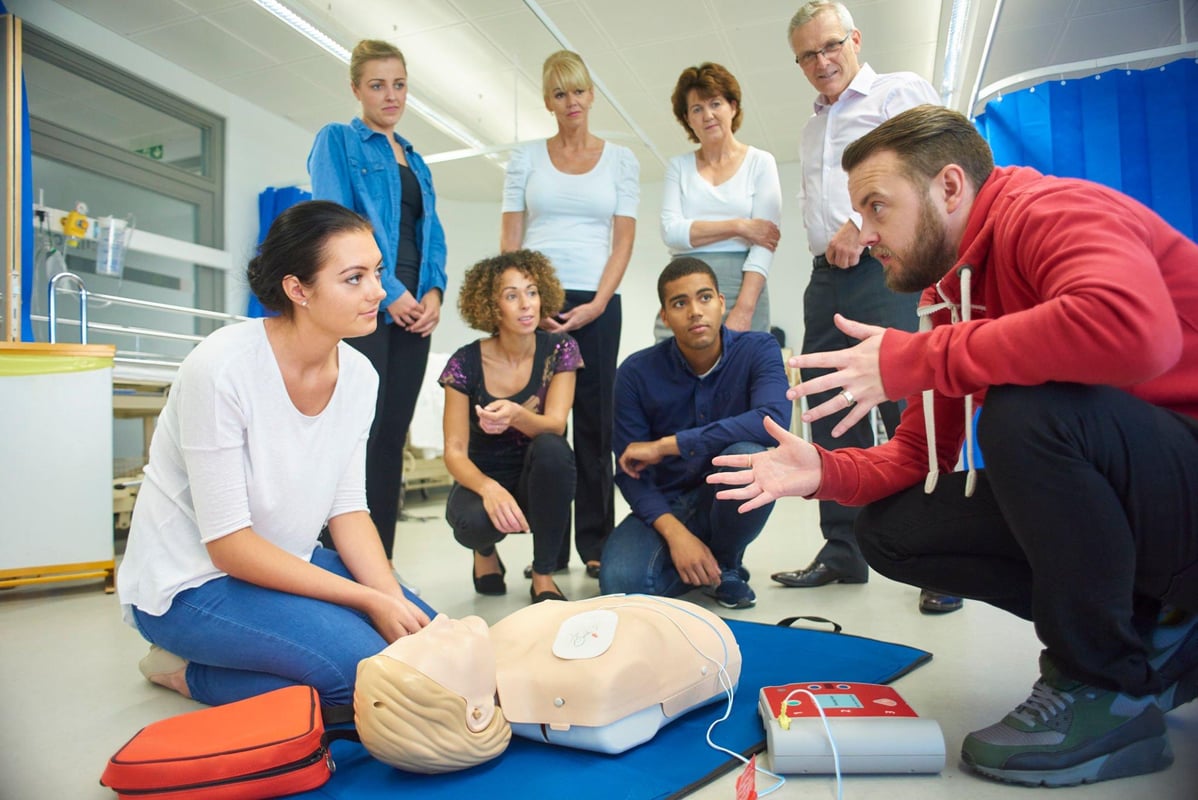
Financial aid (may be available)

Financial aid (may be available)
No cost info
No cost info
$1,300 total
$125 total
$85 total
No cost info
No cost info
No cost info
$36.50 total
No cost info
Considering a career in First Aid? Raleigh, North Carolina is an excellent place to start your journey. This blog post will guide you through everything you need to know about First Aid training in Raleigh, from what First Aid is, to the training requirements, and what to expect in a day-to-day class. We'll also discuss the certification process, how to find related jobs, and what other classes someone can take after becoming a First Aid. Let's get started.

First Aid refers to the immediate assistance given to any person suffering from either a minor or serious illness or injury. The primary goal is to preserve life and prevent the condition from worsening. It can also promote recovery if medical help is not immediately available. In a First Aid course, you will learn vital skills such as CPR, how to treat burns, wounds, and fractures, among others.
Before you dive into a First Aid class, there are few prerequisites you should be aware of:
Basic understanding of English: First Aid courses are usually taught in English, so having a basic understanding of the language is essential for comprehension and communication during practical sessions.
Physical fitness: Some aspects of First Aid, like performing CPR, can be physically demanding. It helps to be in a reasonable state of health and fitness.
Age requirement: Most First Aid courses require participants to be at least 16 years old, though this can vary.
Choosing the right First Aid course is crucial for your learning experience. Here's what you should consider:
Course content: Make sure the course covers a wide range of topics, including CPR, wound care, managing emergencies, etc.
Accreditation: The course provider should be accredited by a recognized body to ensure the training is up to industry standards.
Practical components: First Aid is a hands-on skill. Ensure the course includes ample practical sessions for you to practice what you've learned.
Certification: A course that offers certification upon completion is preferable, as this can be a requirement for certain jobs.
A typical day in a First Aid class in Raleigh will be a mix of theory and practical sessions. You'll learn about different types of injuries and illnesses, and the appropriate First Aid response to each. Practical sessions will give you hands-on experience in executing these responses, under the guidance of experienced instructors.
After completing your course, you'll need to pass a test to earn your First Aid certification. This usually involves a written exam and a practical assessment, where you'll demonstrate your First Aid skills in simulated scenarios. Once you pass, you'll receive a certificate valid for a specified period, usually two years.
First Aid training can open doors to various jobs in the healthcare industry. You could work as a First Aid instructor, a school nurse, a lifeguard, or in emergency services. Check out local job listings in Raleigh, or consider medical-related jobs that require First Aid certification.
After completing your First Aid course, you might consider advancing your skills with other related courses. For example:
Emergency Medical Technician (EMT) training: This can be a natural next step if you're interested in pre-hospital emergency care. Learn more about becoming an EMT in North Carolina.
Certified Medication Aide training: If you're interested in medication administration, this course might be for you. Find out how to become a certified medication aide in North Carolina.
First Aid knowledge isn't just for healthcare professionals. It's a vital skill that can benefit everyone. From workplace emergencies to accidents at home, First Aid knowledge can make a difference between life and death.
If you're interested in advancing your First Aid skills, there are numerous courses for Advanced First Aid, Wilderness First Aid, and even Pediatric First Aid. These courses offer specialized training for different situations and populations.
Certain professions, like coaches, teachers, and childcare workers, often require First Aid certification. If you're in a profession that frequently works with large groups of people or children, obtaining First Aid certification can be an asset.
In today's digital age, online First Aid classes have become increasingly popular. They offer flexibility and convenience, allowing you to learn at your own pace and in your own time.
First Aid training is invaluable, providing life-saving skills and opening doors to numerous career opportunities. Whether you're in Raleigh or elsewhere in North Carolina, there's a First Aid course that's perfect for you. Invest in First Aid training today – it's a skill that can truly make a difference.
Dreambound has written many guides to help you understand what it takes to get this certification. If you're curious about the process or requirements in other states, check out our other guides below:
Exploring different career paths? Dreambound offers in-depth guides to assist you in making well-informed decisions. Explore some of these resources below:
Dreambound's platform allows prospective students to find the right educational program for them through searching, filtering, and connecting with our extensive selection of career & technical education partners.
Dreambound has over 70 programs across healthcare, technology, business, and industrial trades. This includes programs such as Medical Billing, Cybersecurity, and welding.
Some of our schools offer financial aid for those who qualify. Many others offer payment plans, where you can pay the cost of class over time.
Yes, Dreambound offers many online programs. On Dreambound's search, you can filter by online, in-person, and hybrid (part online, part in-person).
Dreambound is completely free for you to use! We are supported by schools and organizations who pay to advertise on our website, so we can offer all of our career resources for free.